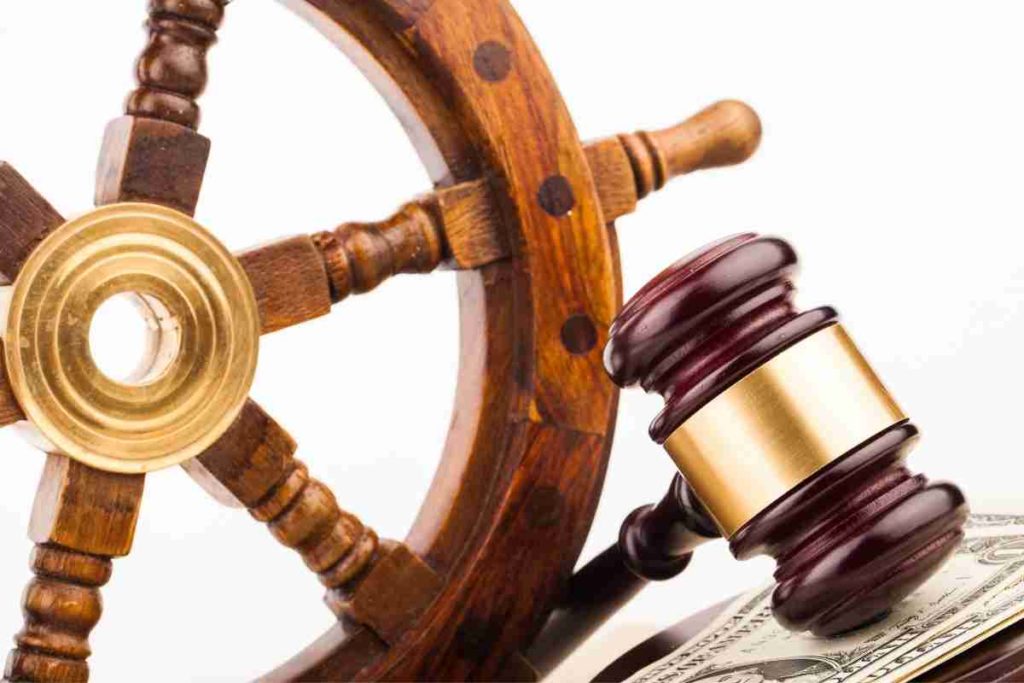WHAT ARE THE DUTIES OF A MARITIME LAWYER?
“What is a marine lawyer and what do they do?” is one of the most often asked questions regarding maritime attorneys.
An attorney who specializes in marine injuries and boating accidents that occur in both leisure and commercial maritime activities is known as a Maritime Lawyer. Maritime lawyers defend not just seafarers who have been hurt on the job but also people who have been harmed in recreational boating accidents.
By trying cases in court, drafting documents, negotiating agreements, and handling complaints about injuries or illnesses caused by various types of marine vessels or sea craft, as well as companies dumping hazardous waste into the sea, maritime attorneys can deal with complaints about injuries or illnesses caused by various types of marine vessels or sea craft, as well as companies dumping hazardous waste into the sea.
WHAT IS MARINE LAW, AND HOW DOES IT APPLY TO YOU?
Maritime law, commonly known as admiralty law, is one of the oldest aspects of law and predates the constitution. Maritime law is described as “law pertaining to commerce and navigation on the high seas and other navigable waterways, controlled by admiralty courts” (source). Maritime law is a broad term that incorporates both domestic and international legislation. These laws provide the regulations that regulate torts, injuries, contracts, and any other form of violation that happens near, on, or in a body of navigable water.
WHAT SKILLS DOES A MARINE LAWYER REQUIRE?
Marine law is sometimes complicated, and maritime attorneys should be familiar with international, federal, and state laws. A maritime lawyer must also be knowledgeable about issues such as marine insurance, marine pollution, and employee compensation (Jones Act), to mention a few. Maritime attorneys must also be aware of international corruption and be familiar with the US Department of Justice’s anti-bribery legislation.
WHERE DOES THE JONES ACT COME FROM?
The Merchant Marine Act of 1920 established the Jones Act, which oversees the shipping of commodities in the United States. The Jones Act is primarily important to persons who are harmed while working at sea. The fundamentals of the law guarantee that an employer is held liable for a worker who is hurt while on the job at sea. A worker protected by the Jones Act is entitled not just to Compensation for pain and suffering but also for all lost wages as a result of the accident.
MARITIME INJURY COMPENSATION CLAIMS
A marine injury claim is comparable to a workers’ compensation claim, with the exception that the payment for a nautical injury is often much bigger. This is owing to the fact that working aboard a ship exposes people to much greater dangers than many other occupations. This is compensated for by the greater settlement. If you were injured on the job and meet the Jones Act’s definition of seamen, Compensation for lost income (past and future), healthcare expenditures, loss of abilities (both physical and mental), any treatments or rehabilitation, discomfort, emotional anguish, and other expenses linked to your injuries might be available.
WHICH PEOPLE ARE COVERED BY THE JONES ACT?
Seamen who are wounded on the job are covered under the Jones Act. A worker must spend at least 30% of his or her time onboard a navigating vessel to qualify as a seaman. This implies that a person may work 70 percent of the time on land but still be protected by the Jones Act if he works 30 percent of the time aboard a vessel.
COMMON CAUSES OF MARINE ACCIDENTS
Despite the fact that marine law encompasses a vast range of topics, certain maritime injuries are more prevalent than others. Slip and fall injuries account for the overwhelming majority of marine vessel accidents. According to OSHA, this sort of incident accounts for somewhat more than 40% of all marine injuries. This is unsurprising given that any form of marine vessel would have a lot of wet surfaces; therefore, companies should make every effort to instruct personnel on how to avoid slip and fall accidents. Exposure to dangerous chemicals and toxic respiratory agents, working in tight places, moving large things, making repetitive motions while working, and working near devices that might cause injury are all examples of other forms of injuries (CDC, 2020).
WHAT SHOULD I DO IF I’M INJURED ON THE WATER?
After an accident, even a marine injury, the first step is to seek medical attention. Even if you don’t intend to file a lawsuit, you want this to be on the record, regardless of the agony and suffering you’re experiencing. You never know what long-term effects your injuries will have, and if you decide to suit later, you are giving yourself that option. Furthermore, you may not be aware of the entire degree of your injuries, and only a medical specialist is qualified to make a final assessment.
If you are able, take photos of the vessel and the work area where you were hurt as soon as possible following the accident. If you are unable to take images yourself, ensure that a colleague can. Even if you don’t plan to sue over your maritime disaster, you’re still safeguarding yourself in case anything goes wrong. Take pictures of the injuries, the surrounding area, and any apparatus or equipment that was in use at the time of the occurrence.
The last step is to contact a skilled marine injury attorney. Most marine lawyers provide a free consultation and can assist you in determining if you have a maritime injury case. If you’d like to talk with a marine attorney at Patrick Daniel Law about your maritime injury, contact (713) 999-6666 or text (713) 903-7588 right now.
Follow us on Twitter
Also, Read Lawyer Brian Schwalb To Run for D.C. Attorney General
Contents





